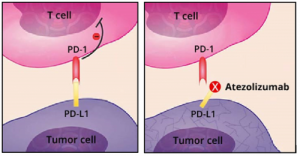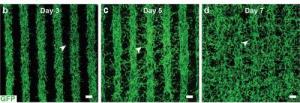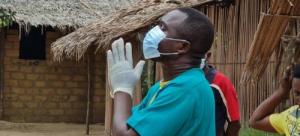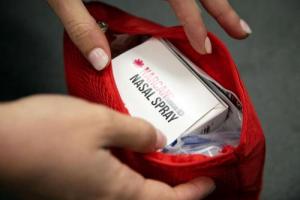Health
NIH clinical trial leads to atezolizumab approval for advanced alveolar soft part sarcoma

Left frame: Normally, tumor cells (purple) evade the immune system’s T cells (pink) by expressing a checkpoint protein known as PD-L1. Right frame: Atezolizumab (Tecentriq) binds to PD-L1 and blocks it from binding to another checkpoint protein, PD-1. This helps T cells regain their ability to kill tumor cells.
- Read more
- 309 reads
Medical Product Alert N°8/2022: Substandard (contaminated) METHOTREX 50mg
This WHO Medical Product Alert refers to one batch of substandard (contaminated) METHOTREXTM (methotrexate) 50mg, identified in two countries (Yemen and Lebanon) in the WHO Eastern Mediterranean region. Methotrexate is on the WHO model list of essential medicines and is indicated for the treatment of cancer and autoimmune diseases.
- Read more
- 279 reads
One Health in G20 countries
The G20 countries are looking for guidance from the One Health Quadripartite in operationalizing One Health (OH) approaches. In 2022, the Quadripartite supported the Indonesian G20 Presidency by developing the Lombok G20 One Health Policy Brief. Multiple consultations with governments and input from the One Health High-Level Expert Panel helped identify seven recommendations for countries to scale up this integrated approach.
- Read more
- 335 reads
WHO updates recommendations on HPV vaccination schedule
In a new position paper, WHO has updated its recommendations for the human papillomavirus (HPV) vaccine. Of particular note, the paper states that a single-dose schedule, referred to as an alternative, off-label single–dose schedule can provide a comparable efficacy and durability of protection to a two-dose regimen. The recommendation for alternative single-dose scheduling was initially made by WHO’s independent expert advisory group, SAGE in April 2022.
- Read more
- 646 reads
NIH researchers use 3D bioprinting to create eye tissue

Growth of blood vessels across printed rows of an endothelial-pericyte-fibroblast cell mixture. By day 7, blood vessels fill in the space between the rows, forming a network of capillaries.
- Read more
- 299 reads
2022 Year In health: New Ebola and cholera outbreaks, mpox emergency, COVID-19 ‘not over’

A health worker in Motema Pembe area prepares for a household decontamination in Mbandaka, Democratic Republic of the Congo.
- Read more
- 330 reads
The Quadripartite establishes the Quadripartite Technical Group on Antimicrobial Resistance and Use Integrated Surveillance (QTG-AIS)
Antimicrobial resistance (AMR) is a global threat to animal and human health, food security, economic growth, and development. It is mostly driven by the inappropriate use of antimicrobials in human, animal, and plant health, food production, and environmental contamination. Effective surveillance of AMR and antimicrobial use (AMU) within and across sectors is an integral part of efforts to monitor the spread and impact of AMR, and to mount an effective One Health response.
- Read more
- 321 reads
WHO announces landmark changes in treatment of drug-resistant tuberculosis
WHO has just released updated consolidated guidelines on the treatment of drug-resistant TB (DR-TB) featuring major improvements in treatment options for people with multidrug-resistant or rifampicin-resistant tuberculosis (MDR/RR-TB). The guidelines include a new recommendation on the use of a novel all-oral 6-month regimen composed of bedaquiline, pretomanid, linezolid and moxifloxacin (BPaLM) in people suffering from MDR/RR-TB or MDR/RR-TB with additional resistance to fluoroquinolones (pre-XDR-TB). The newly recommended BPaLM regimen offers better outcomes, remarkably shortens the duration of treatment, and thus significantly improves quality of life for people with MDR/RR-TB.
- Read more
- 340 reads
NIH-funded study finds hepatitis C treatment gap for individuals with alcohol use disorder
new study supported by the National Institutes of Health shows that individuals with alcohol use disorder (AUD) are less likely to receive antivirals for hepatitis C, despite current guidelines recommending antiviral treatment regardless of alcohol use. Direct-acting antiviral treatment is highly effective at reducing serious illness and death among individuals with hepatitis C virus (HCV) infection, a condition that commonly occurs among people with AUD. Led by scientists at Yale University, New Haven, Connecticut, the research was conducted by a team of international scientists.
- Read more
- 304 reads
NIH launches harm reduction research network to prevent overdose fatalities

Close-up of a person's hands holding a red bag with a box of naloxone nasal spray inside.
- Read more
- 318 reads
Human Rights
Fostering a More Humane World: The 28th Eurasian Economic Summi

Conscience, Hope, and Action: Keys to Global Peace and Sustainability

Ringing FOWPAL’s Peace Bell for the World:Nobel Peace Prize Laureates’ Visions and Actions

Protecting the World’s Cultural Diversity for a Sustainable Future

Puppet Show I International Friendship Day 2020

